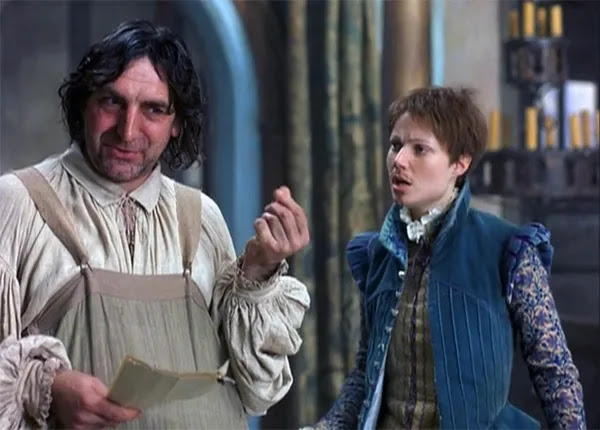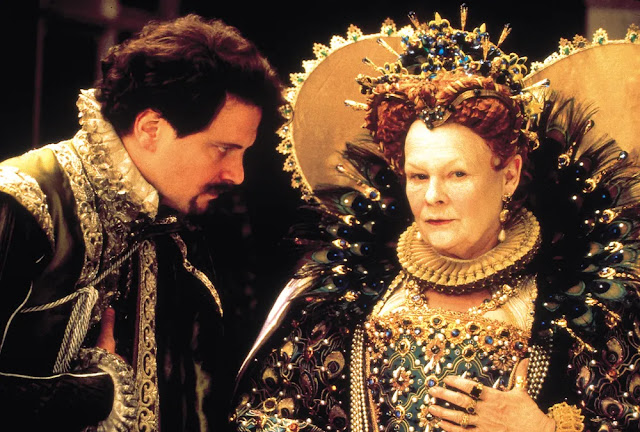Just to get the elephant out of the room right up front, Shakespeare in Love is mostly remembered these days for shocking nearly everyone when it controversially beat out Saving Private Ryan at the Oscars in the spring of 1999. Anyone watching the Oscars that year remembers Harrison Ford coming out on stage with the envelope, assuming we knew what was written on the card inside, including Ford himself who seems surprised and in good humor over the choice. Steven Spielberg, who had just been awarded the Best Director Oscar, is visibly upset over the loss. He was aware of the Weinstein’s down-and-dirty Oscar promotions and refused to get down in the mud with them, fighting back. It cost him a Best Picture win. It wasn’t until much later that I learned about the behind-the-scenes machinations that led to that controversial vote and what changes came to the Academy voting and promotion rules in the aftermath.
It is generally accepted that Saving Private Ryan is the better film and has had the greater staying power. I won’t argue with that. Saving Private Ryan still gets regularly watched annually during the anniversary of D-Day and Veterans Day. It is a powerful film about sacrifice and duty and opens with that incredibly violent and accurate look at the invasion of Normandy. Shakespeare in Love just doesn’t have any of that emotional impact and resonance. But that doesn’t mean it isn’t a worthy film to hold the mantle of Best Picture of the Year. Watching it this morning for the first time since theaters, I was struck by just how good of a film it actually is. For over twenty-five years, all thought of this movie for me has been shaded by my disappointment on Oscar night and not on the film’s own merits. This time around I was determined to look at it without those prejudices and judge it for what it is.
Director John Madden wanted to tell a fictional tale of the writing of Romeo and Juliet, doing so in a farcical way while at the same time not sullying the romance that inspired the play. This meant that the romance was to be front and center while the comedic beats were more in the background, not exactly subtle but more nuanced than an outright farce. The mixture of the two could easily gel as well as oil and water, yet Madden has managed to mix the two in such a way as to make it feel organic and help us forget that what we are watching is almost entirely fiction. My usual statement about not learning history from the movies doesn’t really apply here as there is no real pretense that this is a true story.
The setting is 1593, London, and Philip Henslowe (Geoffrey Rush) is in a bind. He is the owner of The Rose Theatre but is in debt to Hugh Fennyman (Tom Wilkinson) and faces serious injury should he fail to pay up. His only chance of escaping bodily injury is a successful play, but the writer of said play, William Shakespeare (Joseph Fiennes), is suffering from writer’s block, and his muse, Rosaline (Sandra Reinton), is sleeping with other men. He has an idea for a play, one that mixes comedy and romance and involves pirates, but without his muse, the words don’t want to come out.
All this changes when he happens to see Viola de Lesseps (Gwyneth Paltrow), a young woman of wealth with her own set of worries to deal with. Viola is promised to Lord Wessex (Colin Firth), a vain man with no fortune of his own who desires her only for the wealth and social stature it will bring him. Viola doesn’t want to marry him, nor any man, as her dreams are to be in the theatre. Her one great love is watching the live performances, and she dreams on one day being on the stage, herself, even though the realities of the time are that women are not allowed to perform in theatre.
Shakespeare and Henslowe begin holding auditions for the new play, even though it hasn’t been written yet. Viola shows up, disguised as a man named Thomas Kent, and gives a reading that inspires him. But when he tries to speak to Kent, she flees, leading him to the house of de Lesops. Shakespeare leaves a note with her nurse (Imelda Staunton), asking Kent to begin rehearsals at The Rose. Later, he will discover the true identity of Kent, and the two will begin a secret affair. This affair will drive Shakespeare as he writes his new play, Romeo and Juliet, a play that he hopes will bring the realities of love onto the stage and prove that the art form is more than a mere flight of fancy; that it is an art form that can accurately depict true love.
Right out of the gate, we suspect that this is a doomed relationship. British sensibilities and religious beliefs would not allow Viola to break her marriage to Lord Wessex. Neither would it allow her to not go through with the wedding in the first place once her father has made the deal with Wessex for her hand. Shakespeare, too, is a married man, although he is separated from his wife, and she never appears on screen. They may not be together, but the same law that prevents Viola from divorce prevents him, too, and not even the Queen of England, Queen Elizabeth I (Judi Dench), can circumvent that law as it is engrained in the Catholic Church of which she is a member. The only way to successfully end the relationship between Shakespeare and Viola is to have her and her new husband relocated to the Americas. It is an unhappy separation but one that is necessary in the eyes of God. For Viola, it is a punishment as severe as the death of Juliet at the end of the play.
Much of the humor is situational, which allows it to avoid such trappings as pratfalls and mugging. The film is played seriously, even in the face of absurdity. Most of the time, this works, like when Lord Wessex charges into the Rose Theatre intent on running Shakespeare through with a sword and gets bested by the playwright using a fake, blunted weapon. Other times, the humor is just a little too much, like the running gag of John Webster, who obsesses over the morbid. He’s asked one too many times what he thinks about something only to have an answer that is equally bizarre and disturbing. When the play, Romeo and Juliet, is finally performed, and he is asked his thoughts on it, his response is that he liked the part where Juliet stabs herself. This character is cut to far too often, and it undermines the effectiveness of the joke.
The film also relies too much on crude sexual humor. There are numerous love scenes between Shakespeare and Viola, and these are played straight, effectively conveying the heat of passion between these two, but there are also several scenes involving Rosaline that are crude for the sake of a joke, and none of these work at all. We get from the first time we see Rosaline with another man that she is a woman of loose values, but the film hits us over the head with this again and again, including a painfully unfunny scene between her and rival theatre owner Richard Burbage (Martin Clunes) where she continues to ride him while another man has burst into the bedroom to deliver news to Burbage that he has been cheated out of payment for Shakespeare’s play. This scene is neither funny, erotic, nor shocking in the way it is staged; instead, it is merely cringeworthy and in poor taste.
Fiennes and Paltrow are the main reason to watch this movie. Anyone going into this seeking insight into the writing of Romeo and Juliet will be disappointed as anything revealed here is entirely fictional. This will not give you insights nor will it give you a greater appreciation of the play itself. For that, there are far better staged versions of the story that do a better job of bringing the play to life. The romance between Shakespeare and Viola is both sensual and palpable, burning off the screen in a way that is often absent from romantic films. These two have chemistry on screen, and Paltrow especially is good at conveying the desperation in their all-too-brief love affair. Judi Dench is also excellent in her short performance as Queen Elizabeth I, having little screen time but still winning herself an Oscar for her spot on performance.
Shakespeare in Love is a passionate film that has plenty of genuinely humorous moments but also its share of cringy parts. Its overemphasis on raunchy scenes, undercut by its decision to not push the raunch far enough to actually be shocking, neuters things a bit; having that scene between Burbage and Rosaline be chaste enough that the two are fully clothed while going at it full blast ruins any possible shock value that scene might have had. Two strong lead performances and beautiful production values help lift it past these weaker choices. The biggest weak link, though, is the ineffectual character of Lord Wessex, who only exists as a bit of a punchline and to give the sole onscreen performance of the play some stakes. He’s neither menacing nor legitimately funny enough to be effective in this. The film, overall, is better than its current reputation would have you believe, but, as mentioned above, it doesn’t have the holding power that Saving Private Ryan has. It’s a good movie, just not a great one.
Academy Award Nominations:
Best Picture: David Parfitt, Donna Gigliotti, Harvey Weinstein, Edward Zwick, and Marc Norman (won)
Best Director: John Madden
Best Actress: Gwyneth Paltrow (won)
Best Supporting Actor: Geoffrey Rush
Best Supporting Actress: Judi Dench (won)
Best Screenplay - Written Directly for the Screen: Marc Norman and Tom Stoppard (won)
Best Art Direction: Martin Childs and Jill Quertier (won)
Best Cinematography: Richard Greatrex
Best Costume Design: Sandy Powell (won)
Best Film Editing: David Gamble
Best Makeup: Lisa Westcott and Veronica Brebner
Best Original Music or Comedy Score: Stephen Warbeck (won)
Best Sound: Robin O’Donoghue, Dominic Lester, and Peter Glossop
____________________________________________________
Release Date: December 11, 1998
Running Time: 123 Minutes
Rated R
Starring: Gwyneth Paltrow, Joseph Fiennes, Geoffrey Rush, Colin Firth, Ben Affleck, Judi Dench, Simon Callow, Jim Carter, Martin Clunes, Antony Sher, Imelda Staunton, Tom Wilkinson, and Mark Williams
Directed By: John Madden









Comments
Post a Comment